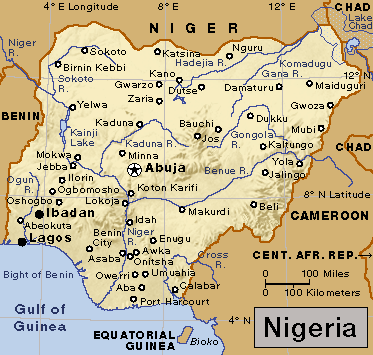Boko Haram Threatens to Sell Kidnapped Girls into Slavery
Tuesday, May 6th, 2014May 6, 2014
The leader of Nigeria’s Islamist militant group Boko Haram has threatened to sell into slavery more than 200 girls seized from their school on April 14. Yesterday, Abubakar Shekau released a video confirming that under his direction, Boko Haram militants had abducted the girls. On May 4, the group kidnapped an additional 8 girls, all between the ages of 12 and 15. The gunmen arrived in two trucks and seized the girls as well as farm animals and food from a village in the northeastern state of Borno, a stronghold of the Islamist movement.
The administration of U.S. President Barack Obama has condemned the kidnappings as an “outrage” and has offered the Nigerian government assistance in trying to find the girls. There is mounting domestic and international anger at the inability of the government of Nigerian President Goodluck Jonathon to protect Nigeria’s civilian population. An offensive ordered by Jonathan to find the girls did little but trigger reprisals against civilians.

Until recently, Boko Haram terrorist activities have been largely confined to northeast Nigeria. However, the Islamist militants in April carried out attacks in Abuja, the capital. (World Book map; map data © MapQuest.com, Inc.)
In its attempt to establish an Islamist state under Shari`ah law, Boko Haram has since 2009 killed tens of thousands of Nigerians, both Christian and Muslim. About half the people of Nigeria are Muslims–the majority of the population in the north. Nearly 40 percent of the people are Christians, who live mainly in southern and central parts of Nigeria.
On April 14, 2014, Boko Haram shocked the nation by carrying out a brazen terrorist attack in the capital, Abuja. It bombed a bus station during the morning rush hour, killing at least 70 people and wounding dozens of others. In February, it attacked a boys’ boarding school in troubled Yobe state and killed some 30 students. The attackers torched a locked dormitory, then brutally murdered the boys as they tried to escape the fire. Schools, particularly schools that teach Nigeria’s national curriculum, are frequent targets of Boko Haram, which roughly translates to “Western education is forbidden.”
Additional World Book articles:
- Nigeria 2009 (a Back in Time article)
- Nigeria 2010 (a Back in Time article)
- Nigeria 2011 (a Back in Time article)
- Nigeria 2012 (a Back in Time article)
- Nigeria 2013 (a Back in Time article)


